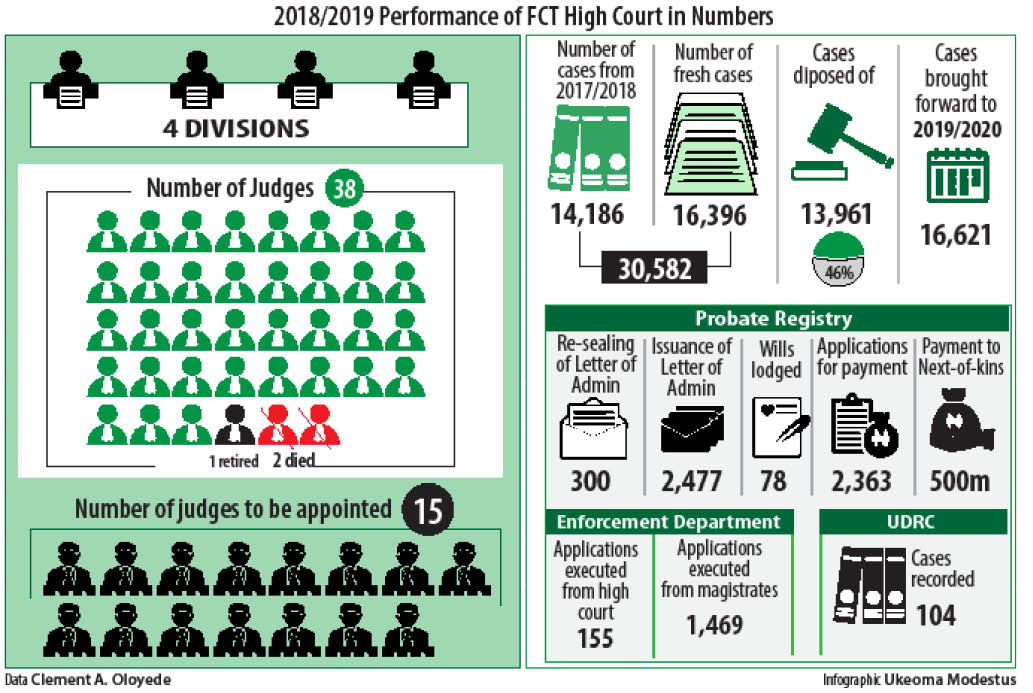How FCT High Court cleared 13,961 cases in 2018/2019
The performance of the Federal Capital Territory (FCT) High Court in disposing 13, 961 cases in the 2018/2019 legal year may seem average at 46 per cent disposal rate, but when considered with the fact that it was achieved with fewer number of judges, it would be acknowledged that the judges went beyond board to […]

The performance of the Federal Capital Territory (FCT) High Court in disposing 13, 961 cases in the 2018/2019 legal year may seem average at 46 per cent disposal rate, but when considered with the fact that it was achieved with fewer number of judges, it would be acknowledged that the judges went beyond board to achieve the performance.
The Chief Judge (CJ) of the FCT High Court, Justice Ishaq Bello, disclosed that the court was able to dispose of the cases which were brought forward and filed in the 2018/2019 legal year with just 35 judges.
While seven new judges joined the FCT judiciary in 2018/2019, it was observed that the court lost three judges: two to death and one to retirement. Justices Chukwu Ndukwe and Valentine Ashi died in April and June 2019, while Justice Sunday Aladetoyinbo retired after clocking 65 years in June, 2019.
Thus as at the beginning of the 2019/2020 legal year, the FCT High Court had 35 judges for its four divisions: Gwagwalada, Bwari, Nyanya and Abuja Municipal (Apo, Lugbe, Gudu, Jabi, Wuse Zone 2 and Maitama, the headquarters).
Speaking on the performance of the court at the ceremonial court session for the commencement of the 2019/2020 legal year, Justice Bello noted that the FCT judiciary was in the process of appointing 15 additional judges to make up for the shortfall in number.
He said, “It is an appointment that must be gotten right. So, it might be slow, but at the end, the appointments will speed up the hearing of cases and reduce delays. We will also appoint additional magistrates for the same purpose this year.”
An analysis of the caseload of the court as presented by the CJ showed that 16,396 were fresh cases and 14,186 were carried over from 2017/2018, bringing the total to 30,582, out of which 13,961 were disposed. The disposal percentage thus stood at 46 per cent.
The CJ said from the statistics it was obvious that on the average, a court had about 850 cases in its docket and about 387 cases decided per judge. This, he said was an indication of the court’s ever-increasing caseload.
Justice Bello further said, “By any standard, the caseload of the judges you see here today is among the heaviest and the most complex across many jurisdictions in the country. This is understandable as litigants prefer to litigate in the FCT on grounds of the confidence we have built overtime. Workload at times puts pressure on our human and material resources.”
He added that the probate registry of the court, which among other functions, issued legal instruments to facilitate the administration and management of wills and estates of deceased persons, received and processed 300 applications for re-sealing of Letters of Administration issued from other jurisdictions.
Within the same period, 2,477 applications for the issuance of Letters of Administration were processed, 78 Wills lodged, and over N500 million disbursed to next-of-kins in respect of 2,363 applications made for payment.
Also, the enforcement department, according to him, executed 1,624 applications comprising of 155 from the court and 1,469 from the magistracy.
However, of worry to the court was the low patronage of the Uwais Dispute Resolution Centre (UDRC), which only recorded 104 cases in the past year. This number, according to the CJ, was unsatisfactory in view of the prominence the Alternative Dispute Resolution (ADR) deserved.
Justice Bello said, “As much as we put effort into our work, we still witness massive dockets, as well as an exponential increase in the inflow. On our part, we will not be deterred, but from the bar, we expect maximum cooperation by the elimination of unnecessary procedures which do little to facilitate the speedy disposal of matters and the promotion of a just settlement.”
Speaking on behalf of the Body of Benchers, Chief Chris Uche (SAN) said the bar would continue to ask for more to be done for the welfare of the judges.
Chief Uche said, “We are aware of the on-going process to appoint 15 more judges for the court, and we support same as a most welcome development.”
Also, the Chairman of the Nigerian Bar Association (NBA), Bwari branch, Clement Chukwuemeka, asked for a state of emergency over the employment of new judges and magistrates.
Chukwuemeka, however, added that there should also be quick assignment of new cases and re-assignment of old cases due to elevation, retirement, transfer or death of judges or magistrates to speed up the dispensation of justice.
